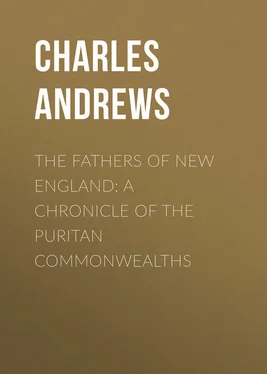Charles Andrews - The Fathers of New England - A Chronicle of the Puritan Commonwealths
Здесь есть возможность читать онлайн «Charles Andrews - The Fathers of New England - A Chronicle of the Puritan Commonwealths» — ознакомительный отрывок электронной книги совершенно бесплатно, а после прочтения отрывка купить полную версию. В некоторых случаях можно слушать аудио, скачать через торрент в формате fb2 и присутствует краткое содержание. Жанр: foreign_antique, foreign_prose, Историческая проза, на английском языке. Описание произведения, (предисловие) а так же отзывы посетителей доступны на портале библиотеки ЛибКат.
- Название:The Fathers of New England: A Chronicle of the Puritan Commonwealths
- Автор:
- Жанр:
- Год:неизвестен
- ISBN:нет данных
- Рейтинг книги:3 / 5. Голосов: 1
-
Избранное:Добавить в избранное
- Отзывы:
-
Ваша оценка:
- 60
- 1
- 2
- 3
- 4
- 5
The Fathers of New England: A Chronicle of the Puritan Commonwealths: краткое содержание, описание и аннотация
Предлагаем к чтению аннотацию, описание, краткое содержание или предисловие (зависит от того, что написал сам автор книги «The Fathers of New England: A Chronicle of the Puritan Commonwealths»). Если вы не нашли необходимую информацию о книге — напишите в комментариях, мы постараемся отыскать её.
The Fathers of New England: A Chronicle of the Puritan Commonwealths — читать онлайн ознакомительный отрывок
Ниже представлен текст книги, разбитый по страницам. Система сохранения места последней прочитанной страницы, позволяет с удобством читать онлайн бесплатно книгу «The Fathers of New England: A Chronicle of the Puritan Commonwealths», без необходимости каждый раз заново искать на чём Вы остановились. Поставьте закладку, и сможете в любой момент перейти на страницу, на которой закончили чтение.
Интервал:
Закладка:
After many misgivings, the fateful decision was reached by the "major parte," and preparations for departure were made. But where to go became a troublesome problem. The merits of Guiana and other "wild coasts" were debated, but finally Virginia met with general approval, because there they might live as a private association, a distinct body by themselves, similar to other private companies already established there. To this end they sent two of their number to England to secure a patent from the Virginia Company of London. Under this patent and in bond of allegiance to King James, yet acting as a "body in the most strict and sacred bond and covenant of the Lord," an independent and absolute church, they became a civil community also, with governors chosen for the work from among themselves. But the dissensions in the London Company caused them to lose faith in that association, and, hearing of the reorganization of the Virginia Company of Plymouth, 1 1 In 1606 King James had granted a charter incorporating two companies, one of which, made up of gentlemen and merchants in and about London, was known as the Virginia Company of London, the other as the Virginia Company of Plymouth. The former was authorized to plant colonies between thirty-four and forty-one degrees north latitude, and the latter between thirty-eight and forty-five, but neither was to plant a colony within one hundred miles of the other. Jamestown, the first colony of the London Company, was now thirteen years old. The Plymouth Company had made no permanent settlement in its domain.
which about this time obtained a new charter as the New England Council, they turned from southern to northern Virginia – that is, to New England – and resolved to make their settlement where according to reports fishing might become a means of livelihood.
But their plans could not be executed without assistance; and, coming into touch with a London merchant, Thomas Weston, who promised to aid them, they entered into what proved to be a long and wearisome negotiation with a group of adventurers – gentlemen, merchants, and others, seventy in number – for an advance of money to finance the expedition. The Pilgrims entered into a partnership with the merchants to form a voluntary joint-stock company. It was understood that the merchants, who purchased shares, were to remain in England; that the colonists, who contributed their personal service at a fixed rating, were to go to America, there to labor at trade, trucking, and fishing for seven years; and that during this time all profits were to remain in a common stock and all lands to be left undivided. The conditions were hard and discouraging, but there was no alternative; and at last, embarking at Delfthaven in the Speedwell , a small ship bought and fitted in Holland, they came to Southampton, where another and larger vessel, the Mayflower , was in waiting. In August, 1620, the two vessels set sail, but the Speedwell , proving unseaworthy, put back after two attempts, and the Mayflower went on alone, bearing one hundred and two passengers, two-thirds of the whole, picked out as worthy and willing to undertake the voyage. The Mayflower reached the waters of New England on the 11th of November after a tedious course of sixty-five days from Plymouth to Cape Cod; but they did not decide on their place of landing until the 21st of December. Four days later they erected on the site of the town of Plymouth their first building.
The coast of New England was no unknown shore. During the years from 1607 to 1620, while settlers were founding permanent colonies at Jamestown and in Bermuda, explorers and fishermen, both English and French, had skirted its headlands and penetrated its harbors. In 1614, John Smith, the famous Virginia pioneer, who had left the service of the London Company and was in the employ of certain London merchants, had explored the northern coast in an open boat and had given the region its name. These many voyages and ventures at trading and fishing served to arouse enthusiasm in England for a world of good rivers and harbors, rich soil, and wonderful fishing, and to spread widely a knowledge of the coasts from Newfoundland to the Hudson River. Of this knowledge the Pilgrims reaped the benefit, and the captain of the Mayflower , Christopher Jones, against whom any charge of treachery may be dismissed, guided them, it is true, to a region unoccupied by Englishmen but not to one unknown or poorly esteemed. The miseries that confronted the Pilgrims during their first year in Plymouth colony were not due to the inhospitality of the region, but to the time of year when they landed upon it; and insufficiently provisioned as they were before they left England, it is little wonder that suffering and death should have accompanied their first experience with a New England winter.
This little group of men and women landed on territory that had been granted to the New England Council and they themselves had neither patent for their land nor royal authority to set up a government. But some form of government was absolutely necessary. Before starting from Southampton, they had followed Robinson's instructions to choose a governor and assistants for each ship "to order the people by the way"; and now that they were at the end of their long voyage, the men of the company met in the cabin of the Mayflower , and drew up a covenant in accordance with which they combined themselves together into a body politic for their better ordering and preservation. This compact, signed by forty-one members, of whom eleven bore the title of "Mister," was a plantation covenant, the political counterpart of the church covenant which bound together every Separatist community. It provided that the people should live together in a peaceable and orderly manner under civil authorities of their own choosing, and was the first of many such covenants entered into by New England towns, not defining a government but binding the settlers to unite politically as they had already done for religious worship. John Carver, who had been chosen governor on the Mayflower , was confirmed as governor of the settlement and given one assistant. After their goods had been set on shore and a few cottages built, the whole body "mette and consulted of lawes and orders, both for their civil and military governmente, still adding therunto as urgent occasion in severall times, and as cases did require."
Of this courageous but sorely stricken community more than half died before the first winter was over. But gradually the people became acclimated, new colonists came out, some from the community at Leyden, in the Fortune , the Anne , the Charity , and the Handmaid , and the numbers steadily increased. The settlers were in the main a homogeneous body, both as to social class and to religious views and purpose. Among them were undesirable members – some were sent out by the English merchants and others came out of their own accord – who played stool-ball on Sunday, committed theft, or set the community by the ears, as did one notorious offender named Lyford. But their number was not great, for most of them remained but a short time, and then went to Virginia or elsewhere, or were shipped back to England by the Pilgrims as incorrigibles. The life of the people was predominantly agricultural, with fishing, salt-making, and trading with the Indians as allied interests. The partners in England sent overseas cattle, stock, and laborers, and, as their profits depended on the success of the settlement, did what they could to encourage its development. The position of the Pilgrims was that of sharers and partners with the merchants, from whom they received directions but not commands.
But under the agreement of 1620 with their partners in London, which remained in force for seven years, the Plymouth people could neither divide their land nor dispose of the products of their labor, and so burdensome became this arrangement that in 1623 temporary assignments of land were made which in 1624 became permanent. As Bradford said, and his comment is full of wisdom:
Читать дальшеИнтервал:
Закладка:
Похожие книги на «The Fathers of New England: A Chronicle of the Puritan Commonwealths»
Представляем Вашему вниманию похожие книги на «The Fathers of New England: A Chronicle of the Puritan Commonwealths» списком для выбора. Мы отобрали схожую по названию и смыслу литературу в надежде предоставить читателям больше вариантов отыскать новые, интересные, ещё непрочитанные произведения.
Обсуждение, отзывы о книге «The Fathers of New England: A Chronicle of the Puritan Commonwealths» и просто собственные мнения читателей. Оставьте ваши комментарии, напишите, что Вы думаете о произведении, его смысле или главных героях. Укажите что конкретно понравилось, а что нет, и почему Вы так считаете.












